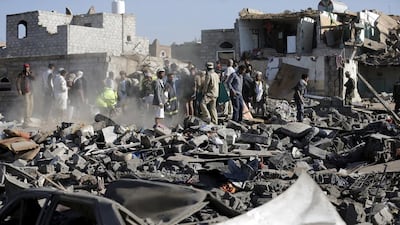Taimur Khan, Justin Vela, and Caline Malek
ABU DHABI / NEW YORK // Washington has been unequivocal in its support for the Saudi-led intervention in Yemen, despite recent GCC criticisms of US policy in the Middle East.
US secretary of state John Kerry spoke in a conference call with his GCC counterparts on Thursday and “commended the work of the coalition taking military action against the Houthis”, according to the state department. The United States is providing intelligence sharing, targeting assistance, advisory and logistical support to the military intervention, it added.
Arab willingness to participate in the US-led coalition against ISIL in Iraq and Syria may have factored into the US support, but analysts in Washington say there are important shared interests in Yemen.
Yemen sits on the strategic Bab Al Mandeb strait, a vital international shipping lane through which million of barrels of oil pass every day. The majority of European oil imports transit Bab Al Mandeb before reaching the Red Sea and Suez Canal. The canal is vital to Egypt’s economy and any threat to the canal can be considered a threat to the country.
The US “doesn’t want to see a threat to the [strait] and something that could affect the security of the Suez Canal”, said Anthony Cordesman, a military analyst at the Center for Strategic and International Studies in Washington.
Mustafa Alani, a senior adviser at the Geneva-based Gulf Research Centre agreed, saying that US interest in Yemen was “not a question of Saudi Arabia or the GCC. It’s the freedom of international navigation”.
By virtue of its geography, Iran already has a military presence on the Strait of Hormuz, another vital energy shipping lane, and the strategic implications of an Iranian-backed militia gaining control of Bab Al Mandeb were likely a key consideration for Washington.
The US “does not want Iran to become a power which has any kind of serious influence in Yemen, particularly where you might see some form of Iranian naval and air presence”, Mr Cordesman said.
The threat to Saudi Arabia’s stability that the Houthi offensive in Yemen could pose, as well as the potential for Al Qaeda’s Yemen branch to exploit the Houthi takeover, also raise serious issues for US security interests in the Gulf.
The reported accuracy of air strikes so far, and the reported deaths of top Houthi officials, suggest that US assistance with targeting has been effective. But any direct military role may depend on how quickly the strikes can push the Houthis to negotiate, and how Riyadh wants the intervention to be perceived.
“When [the administration] talks about strategic partnerships, I think it fully realises that a partnership requires the US to play role — it isn’t simply a matter of turning to allies and having them take over the task,” Mr Cordesman said. But, he added, “is this a case where you may find the coalition of Arab states wanting to be seen as a coalition of Arab states and not as a group dependent on an outside power?”
The strikes may also make Sunnis in Yemen feel like they have a protector. At the start of the Houthi offensive there were concerns that the country’s Sunnis might turn to extremist groups for protection, a factor that contributed to the rise of ISIL in Iraq and Syria.
“This offensive by these countries is to tell the Sunnis of Yemen that ‘you are not alone,’” said Riad Kahwaji, head of the Dubai-based Institute for Near East and Gulf Military Analysis. “That ... you don’t have to resort to Al Qaeda and ISIS to help you”.
The escalation in Yemen comes as US-led negotiations with Iran over its nuclear programme approach a deadline for a framework agreement. Iranian officials have reacted furiously to the Saudi moves, but analysts doubted whether the US role would lead to a breakdown in the talks. A US state department spokesperson said on Thursday that the “situation in Yemen is not having an impact on [negotiations]”.
However, the same spokesperson said that US secretary of state John Kerry “did briefly raise Yemen with his Iranian counterpart”, foreign minister Javad Zarif, during talks on Thursday.
Though the Houthis are backed by Iran, they are not controlled by Tehran as other proxies are in Iraq and Syria. Yemen also holds less immediate strategic importance for Iran’s regional ambitions.
A deal that lifts crippling economic sanctions, however, is key to Tehran.
While Iran may voice its outrage at the military action in Yemen, analysts doubt it will react militarily.
“Their ability to help the Houthis is very limited,” said Mr Alani, pointing out that Yemen is geographically far more distant from Iran than Iraq and Syria.
“The situation is completely different than in other theatres of [Iranian] operations.”
Despite the international support for the military campaign, observers also warned that the human cost could be great.
Luciano Zaccara, of the Gulf Studies Centre at Qatar University, said Yemen could be headed for civil war.
Similar to how Syrians fled to Lebanon, Turkey, and Jordan to escape the war in their own country, Yemeni refugees could soon head for Oman and Saudi Arabia to escape the violence.
“This will increase the security concerns as well as the humanitarian ones,” Mr Zaccara said.
foreign.desk@thenational.ae

